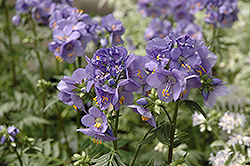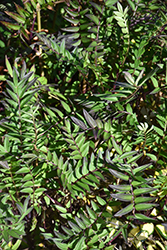Plant Height: 12 inches
Flower Height: 18 inches
Spacing: 10 inches
Sunlight:
![]()
![]()
Hardiness Zone: 2b
Ornamental Features
Bressingham Purple Jacob's Ladder has masses of beautiful spikes of blue flowers rising above the foliage from mid spring to mid summer, which are most effective when planted in groupings. Its attractive ferny pinnately compound leaves emerge burgundy in spring, turning dark green in colour with distinctive deep purple edges throughout the season. The deep purple stems are very colorful and add to the overall interest of the plant.
Landscape Attributes
Bressingham Purple Jacob's Ladder is an herbaceous perennial with tall flower stalks held atop a low mound of foliage. Its relatively fine texture sets it apart from other garden plants with less refined foliage.
This is a relatively low maintenance plant, and is best cleaned up in early spring before it resumes active growth for the season. Deer don't particularly care for this plant and will usually leave it alone in favor of tastier treats. It has no significant negative characteristics.
Bressingham Purple Jacob's Ladder is recommended for the following landscape applications;
- Mass Planting
- General Garden Use
Planting & Growing
Bressingham Purple Jacob's Ladder will grow to be about 12 inches tall at maturity extending to 18 inches tall with the flowers, with a spread of 12 inches. When grown in masses or used as a bedding plant, individual plants should be spaced approximately 10 inches apart. Its foliage tends to remain dense right to the ground, not requiring facer plants in front. It grows at a medium rate, and under ideal conditions can be expected to live for approximately 10 years. As an herbaceous perennial, this plant will usually die back to the crown each winter, and will regrow from the base each spring. Be careful not to disturb the crown in late winter when it may not be readily seen!
This plant does best in full sun to partial shade. It does best in average to evenly moist conditions, but will not tolerate standing water. It is not particular as to soil type or pH. It is somewhat tolerant of urban pollution. This particular variety is an interspecific hybrid. It can be propagated by division; however, as a cultivated variety, be aware that it may be subject to certain restrictions or prohibitions on propagation.
Disclaimer - This resource is provided for informational purposes only and does NOT reflect current availability. Inventory varies seasonally, so we cannot guarantee that every plant will be in stock at all times - please contact your favourite GardenWorks location directly for current availability. It does not include our entire inventory of plants, so be sure to visit GardenWorks to see varieties that may not be represented on this list.


